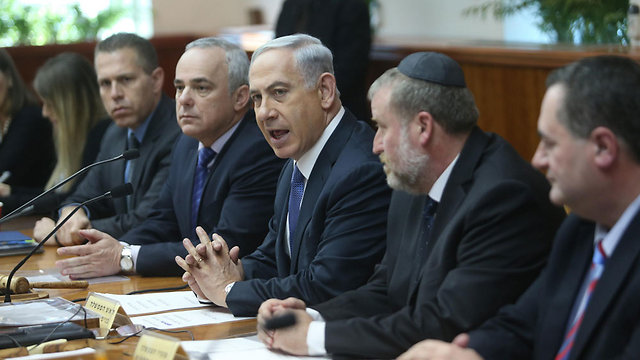Has Israel been cut out of Iran’s nuclear negotiations?
Majid Rafizadeh/Al Arabiya
Friday, 20 February 2015
In recent days, the tension, deep disagreements and mistrust between Israeli Prime Minister Benjamin Netanyahu and President Obama have further stepped up, particularly over the ongoing nuclear negotiations between Iran and the six world powers (known as the P5+1; the United States, United Kingdom, Germany, France, Russia, and China). As the nuclear talks inch forward towards the March deadline, Iranian and American negotiators appear to be the major players in shaping the general principles of a final nuclear deal.
While the disagreement between the American administration and Netanyahu persist, the Israeli prime minister is planning to deliver a speech to the U.S. congress on March 3rd (three weeks before the first phase of agreement on general principles). The speech further reflects the rift and mistrust between the two leaders.
The Israeli prime minister has been critical of the Obama administration due to the White House’s tilt towards the Rowhani administration and the compromises being made The backbone of the speech will likely revolve around Iran’s nuclear and ideological threat, as well as Tehran’s recent advancement and dominance in Iraq and Syria. The speech will provide the Israeli prime minister with a high level platform in order to influence the nuclear negotiations and potentially make his case as to why the current nuclear talks are flawed and misleading. Although the speech may be viewed as a blow to the Obama administration, nevertheless, it is less likely to cause severe damages to U.S.-Israeli ties.
The widened mistrust: Leaked information
The Israeli prime minister has been critical of the Obama administration due to the White House’s tilt towards the Rowhani administration and the compromises being made. In order to alleviate the security and geopolitical concerns of the Israeli administration, the White House had likely been updating Tel Aviv on the nuclear talks. However, this trend appears to have been partially altered. The Obama administration’s suspicion and mistrust came at a time when the White House is concerned that Netanyahu had given the authorization to officials to leak some nuances of the nuclear talks to Israeli journalists, such as the details that President Obama accepted to allow the Islamic Republic to maintain ”6,500 or more centrifuges as part of a final deal.”
Several reasons can be behind the leak of information, including concerted efforts to reveal the Obama administration’s unprecedented compromises to Iran, to show Tehran’s leverage over Washington in the nuclear talks and to reflect on the White House’s tilt towards Tehran rather than Israel. The leaked information has prompted speculations that the Obama administration is cutting the Israeli government out of the nuclear talks. The White House’s efforts are to prevent any attempt that might scuttle the potentiality of striking a final nuclear deal with the Islamic Republic.
Nevertheless, the Obama administration is less likely to halt updating Israel on the nuclear talks due to the security concerns. But, this does not necessarily mean that the White House will give in to the demands of Netanyahu on how to deal with Iran’s nuclear file.
Netanyahu VS Obama over Iran
Netanyahu’s position on curbing Iran’s nuclear program differs substantially with that of the Obama administration. From the Israeli prime minister’s perspective, any final nuclear deal between Iran and the P5+1, which does not urge the Islamic Republic to dismantle its nuclear program completely, is a defective deal. Such a nuclear pact, from Netanyahu’s point of view, would jeopardize Israel’s regional security and tip the balance of power in favor of the Islamic Republic. The Obama administration, on the other hand, will be satisfied with a final nuclear pact that keeps Tehran only one year away from break-out capacity or developing nuclear weapons.
This follows that the administration will accept a deal that permits Tehran to enrich uranium at some level, maintain some of its centrifuges, and continue nuclear research and development within a specified framework. Netanyahu, however, contends that the Islamic Republic should not be allowed to enrich uranium or spin centrifuges. President Obama echoed his deep disagreement with Netanyahu in the recent Joint Press Conference stating: “I don’t want to be coy, the prime minister and I have a very different idea of Iran sanctions.” He insisted on embracing a final deal, saying: “I have been very clear and Angela agrees with me and David Cameron agrees with me, and the other members of the organizations agree that it does not make sense to sour the negotiations a month or two before they are about to be completed. And we should play that out, if in fact we can get a deal we should embrace that.”
Finally, for Netanyahu, the 10-15 years final nuclear agreement will allow Iran to resume enrichment after the end of this period. In addition, there is suspicion that the International Atomic Energy Agency will not be capable of effectively monitoring all dimensions of Iran’s nuclear activities. The accumulated economic sanctions were mainly due to the IAEA’s failure to detect Iran’s secret nuclear activities.
The major rift between Netanyahu and Obama comes from the fact that the White House believes there is no other effective alternative than pursuing the nuclear talks and ultimately working out a final nuclear pact with Iran in the next few months. Netanyahu views other alternatives- such as ratcheting up sanctions on the Islamic Republic or striking Iran’s nuclear infrastructure in case Iran continues to enrich uranium- as effective methods. Finally, the mistrust between Obama and Netanyahu over Iran is unlikely to cause a lethal blow to U.S.-Israel relations. But, it is also unlikely to influence the direction of the nuclear talks and the Obama administration’s stance on the nuclear negotiations.

















